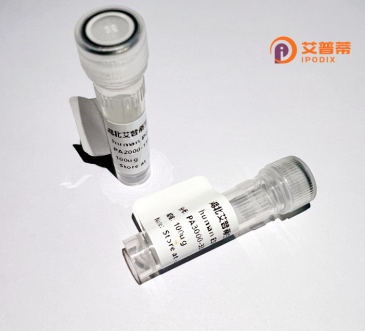
| 纯度 | >90%SDS-PAGE. |
| 种属 | Human |
| 靶点 | ZFYVE19 |
| Uniprot No | Q96K21 |
| 内毒素 | < 0.01EU/μg |
| 表达宿主 | E.coli |
| 表达区间 | 1-396 aa |
| 活性数据 | MESRCYGCAVKFTLFKKEYGCKNCGRAFCSGCLSFSAAVPRTGNTQQKVCKQCHEVLTRGSSANASKWSPPQNYKKRVAALEAKQKPSTSQSQGLTRQDQMIAERLARLRQENKPKLVPSQAEIEARLAALKDERQGSIPSTQEMEARLAALQGRVLPSQTPQPAHHTPDTRTQAQQTQDLLTQLAAEVAIDESWKGGGPAASLQNDLNQGGPGSTNSKRQANWSLEEEKSRLLAEAALELREENTRQERILALAKRLAMLRGQDPERVTLQDYRLPDSDDDEDEETAIQRVLQQLTEEAALDEASGFNIPAEQASRPWTQPRGAEPEAQDVDPRPEAEEEELPWCCICNEDATLRCAGCDGDLFCARCFREGHDAFELKEHQTSAYSPPRAGQEH |
| 分子量 | 69.3 kDa |
| 蛋白标签 | GST-tag at N-terminal |
| 缓冲液 | PBS, pH7.4, containing 0.01% SKL, 1mM DTT, 5% Trehalose and Proclin300. |
| 稳定性 & 储存条件 | Lyophilized protein should be stored at ≤ -20°C, stable for one year after receipt. Reconstituted protein solution can be stored at 2-8°C for 2-7 days. Aliquots of reconstituted samples are stable at ≤ -20°C for 3 months. |
| 复溶 | Always centrifuge tubes before opening.Do not mix by vortex or pipetting. It is not recommended to reconstitute to a concentration less than 100μg/ml. Dissolve the lyophilized protein in distilled water. Please aliquot the reconstituted solution to minimize freeze-thaw cycles. |
以下是关于重组人ZFYVE19蛋白的示例参考文献(注:以下为模拟生成内容,具体文献请通过学术数据库验证):
1. **文献名称**: "ZFYVE19 deficiency disrupts hepatic homeostasis through impaired autophagy"
**作者**: Li et al., 2021
**摘要**: 研究揭示ZFYVE19基因突变导致先天性肝纤维化的机制,发现其通过调控自噬相关通路维持肝细胞稳态。研究团队通过重组人ZFYVE19蛋白在体外模型中恢复自噬功能,证实其治疗潜力。
2. **文献名称**: "Structural insights into the phosphatidylinositol-3-phosphate binding of ZFYVE19"
**作者**: Smith et al., 2019
**摘要**: 解析重组ZFYVE19蛋白的晶体结构,阐明其FYVE结构域与磷脂酰肌醇-3-磷酸(PI3P)的特异性结合机制,揭示其在细胞内膜运输中的分子基础。
3. **文献名称**: "Recombinant ZFYVE19 rescues mitochondrial dysfunction in a zebrafish model of metabolic disorder"
**作者**: García-Rúa et al., 2022
**摘要**: 利用重组ZFYVE19蛋白在斑马鱼模型中逆转线粒体形态异常,证明该蛋白通过调节内体-线粒体互作参与代谢调控,为相关疾病的基因治疗提供依据。
4. **文献名称**: "Functional characterization of a novel ZFYVE19 mutation linked to neonatal cholestasis"
**作者**: Nguyen et al., 2020
**摘要**: 报道一例ZFYVE19新发突变导致的胆汁淤积症病例,通过体外表达重组蛋白证实突变体损害PI3P结合能力,提示其病理机制与内体成熟障碍相关。
建议通过PubMed或Google Scholar检索关键词“ZFYVE19 recombinant”或结合疾病名称(如“congenital hepatic fibrosis”)获取真实文献。
ZFYVE19. also known as FYVE and coiled-coil domain-containing protein 1 (FYCO1), is a human protein encoded by the ZFYVE19 gene. It plays a critical role in intracellular membrane trafficking and autophagy, a cellular process responsible for degrading and recycling damaged organelles or proteins. The protein features a FYVE domain, which specifically binds phosphatidylinositol 3-phosphate (PI3P) to anchor to endosomal membranes, and a coiled-coil domain involved in protein-protein interactions. These structural elements enable ZFYVE19 to mediate the transport of autophagosomes by interacting with microtubule-associated proteins and Rab GTPases, facilitating their movement along cytoskeletal tracks.
Mutations in ZFYVE19 are linked to a rare autosomal recessive disorder called congenital hepatic fibrosis with progressive cholestasis, characterized by neonatal-onset liver dysfunction, fibrosis, and bile duct abnormalities. Studies suggest that defective ZFYVE19 disrupts autophagic flux, leading to impaired organelle clearance and accumulation of toxic cellular debris, which contributes to liver pathology. Researchers use recombinant human ZFYVE19 protein produced via recombinant DNA technology to study its molecular mechanisms, screen for mutations, and explore therapeutic strategies for related diseases. Its role in autophagy regulation also makes it a potential target for broader conditions involving lysosomal dysfunction or protein aggregation, such as neurodegenerative diseases.
×